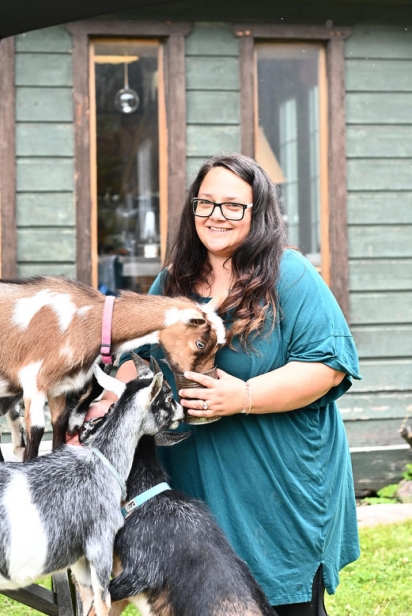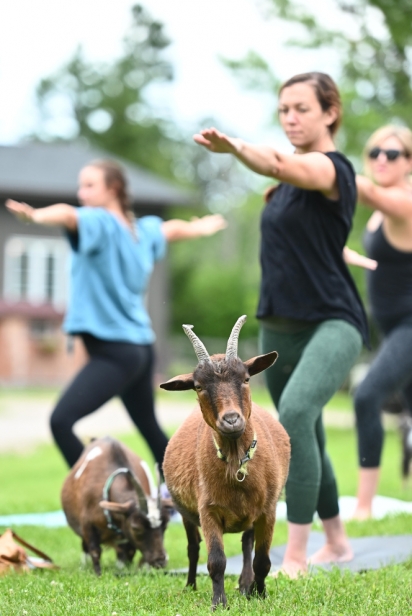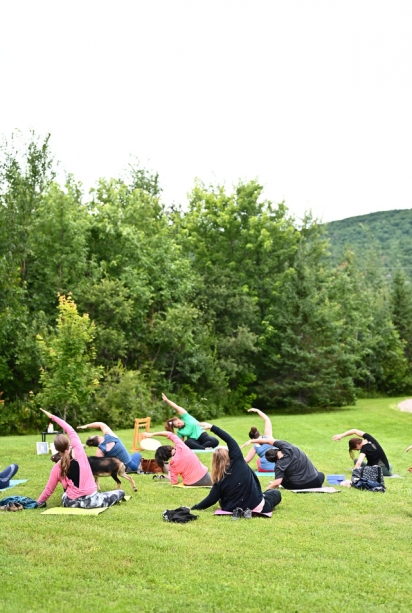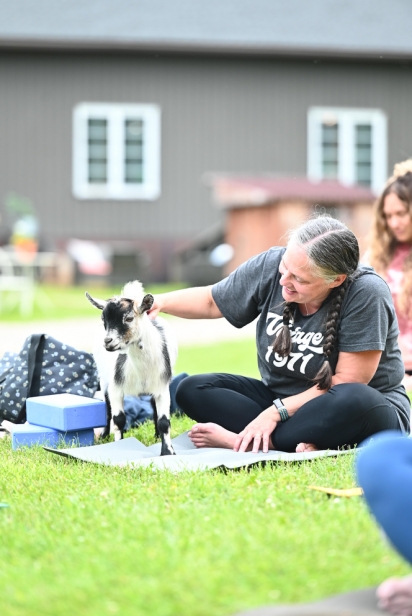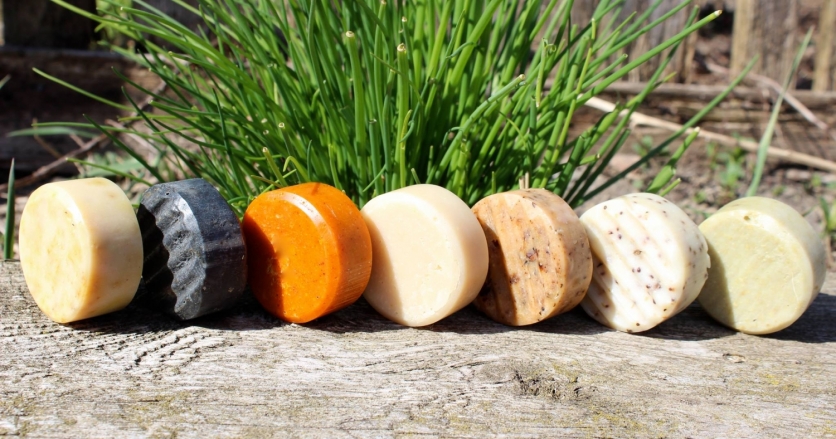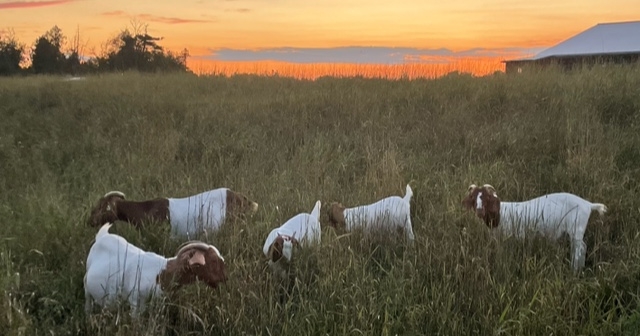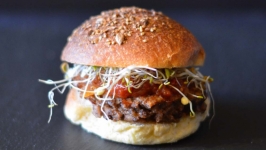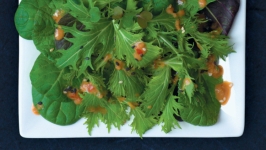Totally Goat: Good for Body and Soul
Mountain View Farm
Could there be a better way to spend a Saturday morning than doing a spot of yoga with a view and some goat companions? If this sounds like heaven, you’re in luck and you can do it in this lifetime.
In 2016, Renée Savoie, a labour relations officer with the federal government, and her husband Chris Baal, an IT specialist, moved out of Aylmer with their three daughters, then aged 6, 12 and 16, “looking for more of a connection to the land.” They were not farmers.
They started with chickens on their smallholding in Luskville, “just to get our feet wet,” Savoie recalls. Then they got their first horse — there are now three on the property — and next, when at an alpaca farm belonging to a friend, the owner invited them to see the goats. They were immediately besotted. Shortly thereafter, Savoie was looking on Kijiji and saw an ad for a pair of Pygmy goats. She and Baal drove an hour and a half, “into the middle of nowhere,” to find two goats in terrible condition. “It was the middle of winter, we didn’t even have any hay, but we negotiated with the owner, threw them in the back of the minivan and brought them home. They became like dogs. They were very frightened and followed us everywhere. We call this pair our gateway goats.”
The couple now has 10 goats — Pygmy and Nigerian Dwarf breeds — that roam freely when either Baal or Savoie is outside. They have been trained to follow their humans, not to run away. And they’ll happily graze between clients while a yoga class takes place on the lawn, with views of the Luskville escarpment. “We want to bring mindfulness, sustainability and creativity to people’s lives,” Savoie says. “We know how hard it was to get out of the rat race, and we want people to experience the joy that we have here.”
Next, the two aspire to grow their own food (and more) on five acres of land to the far side of their house. Ideally, Savoie would like to make the farm her full-time job. She has hosted art events and private retreats, a birthday party and a Mothers’ Day Tea party. There is a small she-shed on the property, which serves as a studio for workshops such as natural fabric dyeing and visible mending or a Father’s Day painting and goat snuggles event, for example. It also serves as a shop selling beeswax wraps that Savoie has made, as well as natural wool dryer balls, re-purposed quilts, goat milk soaps, lavender bags, linen sprays and more.
In previous years, Savoie has organized a Farm Hop on the first Saturday in May and the first Saturday in November. But for now, it’s the goat yoga that brings in the regulars. “Between 15 and 20 people generally come,” she says, “and mostly they come from Ottawa. Many of them say the whole experience is magical, being removed from their day-to-day stresses, and especially the goat snuggles afterwards.”
Mountain View Farm
575 Chem. Crégheur, Luskville, Que.
mountainviewfarm.ca | @mountainviewfarmqc
At the end of a road in the hills behind Wakefield, as far back into the misty countryside as you can go, Weibke Martin raises Nubian goats. She started with just a few to provide milk for the household when her four children were little. Those children are now grownup and gone. And Weibke has close to 50 goats.She is known across Canada as a pedigree Nubian goat breeder, careful about choosing great bloodlines. Each spring she sells off some of the kids that she will not be keeping for her goat-milk soap-making operation. At six weeks old, the babies are weaned and sent off all over the country by air.
This year, she has been milking 23 goats, two times daily, by hand. The milkers cheerfully follow her into the barn where they nimbly hop up onto a little wooden platform, which means that their udders are at the perfect height for Weibke to reach when seated on a stool.
Her daily milking produces about 115 litres, some of which she uses to make soft cheese, but most of which she freezes to provide the raw ingredients for Apple Road Goat Milk soaps.
“The milk from Nubians is particularly suited for soap-making, as while the goats might not produce as much milk as other breeds, their milk has the highest butter fat content,” Weibke says. “It’s perfect for making luxurious, creamy soap.”
She makes Apple Road soaps by hand in small batches, curing most for between four to six weeks, with the plain Castille curing for a year, producing dense soaps that will not shrink further. They come in 19 different varieties, scented with essential oils such as spearmint, wintergreen, sweet orange, lavender, tea tree, cilantro, lemongrass, rose and geranium, among others. And they are works of art. Gatineau Hill Sunset features a setting sun against a sky striped in yellow, red and orange; candy cane is wavy red and white, while For-Evergreen has the outline of a deep green tree set against a cream background.
Martin makes soap daily. She also makes some of the scents and other ingredients that go into them. In early spring, there are jars of olive oil stuffed with vibrant yellow dandelion flowers, curing in the sun. She shakes these jars twice daily for six weeks. The result is a creamy, rich dandelion and honey bar.
After she mixes the ingredients for a soap, she pours them into a mold and leaves them to cure. Next, she cuts them, pares them into pleasing shapes, wipes them and wraps them in wax paper tied up with brown string and a name tag, complete with a list of ingredients. It’s is a labour of love, luxurious on the skin and a scent sensation.
Martin sells her soap under the Apple Road brand, chosen because when she bought her farm, the road was lined with wild and heritage apple trees. Her products can be found online at appleroad.ca or at the Wakefield Farmers’ Market on Saturdays throughout the summer.
Apple Road Goat Milk Soaps
appleroad.ca | @apple.road.goat.milk.soaps
Fossil Ridge Farms
Just 30 minutes to the east of Ottawa at Fossil Ridge Farms, Claudia Kaelin raises Boer goats on a family farm where she also produces Limousin cattle and turkeys. All around her are cash crops such as soy, wheat, oats and barley on 3,200 acres. For Kaelin, the animals are the heart of the farm, the cash crops her parents’ concern.
After a degree at McGill University, she started with three cows. Now she has a herd of 25 cow-and-calf pairs, a pair of breeding pigs and 11 growers. But more importantly, she has 30 goats. Some are breeding does, but the remainder are destined for meat. “Boer are the No. 1 meat breed,” Kaelin explains. “They come from Africa and are meant for arid climates, so they are browsers. They pick and choose what they eat.” For this reason, she has to train them to eat grass. “If they don’t learn to graze, they won’t touch grass,” she says.
When she enters the goats’ field, they come running up, looking for a scratch and a little acknowledgement. She will keep the best performers as breeding stock, sending the remainder out for slaughter at about eight months, depending on size.
Goat is a premium meat. Animals that weigh 90 pounds at slaughter, weigh only about 40 pounds once they are dressed. By way of price comparison, a pound of ground beef is approximately $10 a kilo, while goat comes in at $22. It is lower in saturated fat and cholesterol and higher in iron than other red meats, while it has similar levels of protein to beef. It is also the most widely consumed meat in the world, because there are fewer cultural taboos surrounding its consumption. It is a staple in many parts of Africa, Jamaica and the West Indies, largely because goats are hardy and small, they are easier to raise for a smallholder than a cow, and they don’t need rich pasture.
“There are always people who want to give it a try,” says Kaelin, who sells her meat at the farm gate, online and at farmers’ markets in Bourget, Rockland, Kiwan and Alta Vista, “but some people, while interested, are hesitant about spending a premium on something they don’t know how to cook.” Kaelin recommends treating the meat as you would a cut of lamb. Goat meat makes excellent stew and curry.
“My goal was to provide locally raised meat in a sustainable and eco-friendly manner using marginal land that cannot be used for any other purpose,” Kaelin says. “Every single one of these animals is raised right here on our farm, on pasture, eating from land that is otherwise uncultivable. Since adding livestock to these lands, not only have we seen a decrease in invasive plant species, but also increased general health of the land they reside on and an increase in wildlife populations.”
Fossil Ridge Farms
2141 Pilon Rd., Saint-Pascale-Baylon, Ont.
fossilridgefarms.ca | @fossilridgefarms


